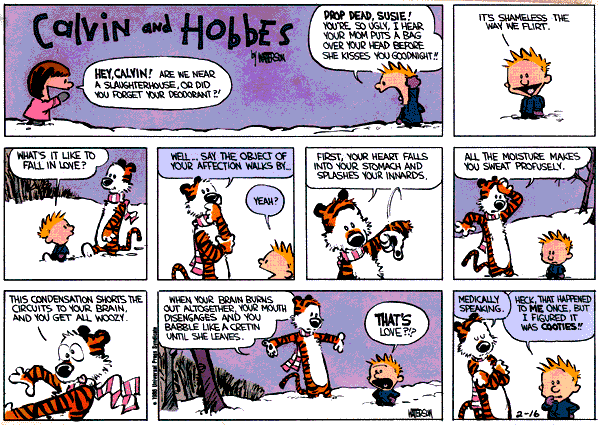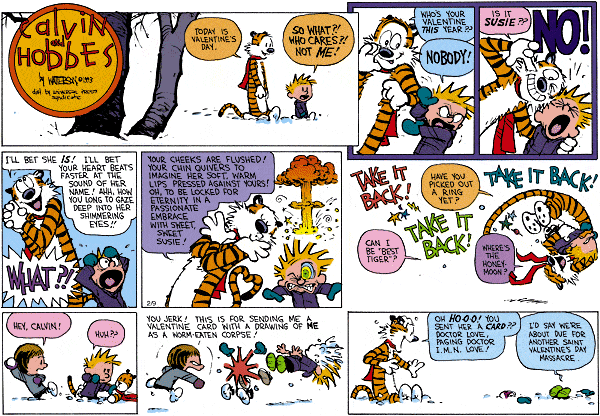
1. In The New Yorker, Adam Gopnik took the release of two new books about the history of atheism to issue one of his periodic ‘state of modern belief” pieces. Most of the word count is devoted to the question of when the burden of proof definitively shifted from atheists to believers (The Onion weighs in here), and while there are certainly some interesting tidbits, one can’t help but be distracted by: first, wasn’t the exact opposite thing was being said five years ago?, and second, the dichotomy he embraces from one of the books is downright weird, at least to a “religious” ear. Meaning, I know very few Christians who would feel comfortable with this idea of Atheists as Self-Makers and Believers as Super-Naturalists — in practice, we are all self-makers and super-naturalists. Not that Christianity ever claims to move people “above” nature (but rather deeper into it – cue Wiman). He even seems to fall for the whole doubt vs. faith thing! Sigh. In other words, (3) there’s not nearly enough awareness of “religions that aren’t called religions,” of how the worshiping human heart actually works, divine object or no. Finally, his mis-characterization of D.B. Hart’s arguments makes him sound nearly as fatuous as he claims believers cast those who can’t “take the leap”… That said, Gopnik is a gifted writer, so there are some memorable moments, for example:
My own favorite atheist blogger, Jerry Coyne, the University of Chicago evolutionary biologist, regularly offers unanswerable philippics against the idiocies of intelligent design. But a historian looking at his blog years from now would note that he varies the philippics with a tender stream of images of cats—into whose limited cognition, this dog-lover notes, he projects intelligence and personality quite as blithely as his enemies project design into seashells—and samples of old Motown songs. The articulation of humanism demands something humane, and its signal is disproportionate pleasure placed in some frankly irrational love. Stephens, for that matter, takes his title from the seemingly forthright John Lennon song “Imagine.” Lennon, having flirted with atheism for about nine months, from Christmas of 1970 to the fall of 1971, fell back into a supernaturalist web of syncretism of his own, flying the “wrong,” or westerly, way around the world and practicing astrology. Stephens says diplomatically that Lennon “remained intermittently susceptible to belief”—but in truth Lennon was entirely captive to whatever superstition had most recently tickled his fancy, or his wife’s. Imagine there’s no Heaven—but pay attention to the stars and throw the I Ching as necessary. The maker of the great atheist anthem was anything but an atheist.
2. Those looking for a bit more meat on the bone should leaf over a few pages in The Times, to where Gary Gutting picks philosopher Alvin Plantinga’s brain about the question of whether atheism is irrational. There’s a lot in the interview but one of my favorite bits has to do with how Plantinga accounts for higher levels of atheism in philosophy departments than other disciplines:
Thomas Nagel, a terrific philosopher and an unusually perceptive atheist, says he simply doesn’t want there to be any such person as God. And it isn’t hard to see why. For one thing, there would be what some would think was an intolerable invasion of privacy: God would know my every thought long before I thought it. For another, my actions and even my thoughts would be a constant subject of judgment and evaluation.
Basically, these come down to the serious limitation of human autonomy posed by theism. This desire for autonomy can reach very substantial proportions, as with the German philosopher Heidegger, who, according to Richard Rorty, felt guilty for living in a universe he had not himself created. Now there’s a tender conscience! But even a less monumental desire for autonomy can perhaps also motivate atheism.
Of course, if there’s no God, how do you explain the Lake Placid Winter Olympics in 1932?
3. Valentines-wise, a touching Modern Love appeared in The NY Times recently, “Did Mother, Maybe, Not Know Best?”, about a woman deciding to propose to her boyfriend of 13 years and the long journey involved in finally ducking the law imposed by her mother about how “thou shalt not need a man”. Come to find out, her mother’s hardened edict falsely equated independence with strength, and as such, prevented her daughter from giving herself fully to her relationship. As she puts it: “My mother was partly right: I didn’t need a man. Instead, it turned out I needed one particular man. It took me a ridiculously long time to recognize the difference.”
On a related note, Moira Weigel and Mal Ahern produced a truly clever structural analysis of “Dating in the Expanded Field” for The New Inquiry, taking Rosalind Krauss’ “Sculpture in the Expanded Field” affectionately as their model. Nerdy humor at its best, the first two paragraphs should give you a good feel, ht SZ:
Over the past 10 years, rather surprising things have come to be called “dating”: midnight invitations to parties-in-progress, hookups arranged entirely by email, or one-on-one excursions to movies and drinks with a friend with whom one has drunkenly slept. Some long-term partners use “dating” to describe the relationship that each of them has to a third, who supports both as their patron, while others take “dating” to mean lying about in their pajamas and queuing up yet another episode of Breaking Bad.
No category could cover such a motley of activities unless that category had become almost infinitely malleable. And indeed the meaning of the term dating has grown so vague that it obscures the very thing it is supposed to capture. Boomer parents bewail the hookup culture that they say has replaced dating, while their adult children stare into the abyss of Craigslist and wonder whether they even know what dating is. Yet we would submit that we know very well what dating is. And one of the things we know is that it is a historically bounded category, not an eternal one.
Click over to sample some of the highly amusing diagrams they included.
4. A stirring eulogy for Philip Seymour Hoffman over at The American Interest by our fiend Daniel Matthew Varley. Elsewhere, Russell Brand ruminated on the tough questions raised by the actor’s death, giving us yet another one of his inimitable treatises on addiction, ht CWZ:
The reason I am so non-judgmental of Hoffman or Bieber and so condemnatory of the pop cultural tinsel that adorns the reporting around them is that I am a drug addict in recovery, so like any drug addict I know exactly how Hoffman felt when he “went back out”. In spite of his life seeming superficially great, in spite of all the praise and accolades, in spite of all the loving friends and family, there is a predominant voice in the mind of an addict that supersedes all reason and that voice wants you dead. This voice is the unrelenting echo of an unfulfillable void.
Philip Seymour Hoffman’s death is a reminder, though, that addiction is indiscriminate. That it is sad, irrational and hard to understand. What it also clearly demonstrates is that we are a culture that does not know how to treat its addicts. Would Hoffman have died if this disease were not so enmeshed in stigma? If we weren’t invited to believe that people who suffer from addiction deserve to suffer?
5. Humor-wise, The American Jesus collected some harrowing/hilarious examples of Jesus-ified Valentines Day kitsch, ht RW. The Onion nailed street corner evangelism with their slightly uncomfortable (but undeniable) “Hello, Do You Have A Moment To Tell Me About Jesus Christ?” They also reported that “Nation’s Girlfriends Admit Absolutely Everything Riding On Valentine’s Day”.
6. In music, the Denver Westword had the good sense to put together a list of The Ten Best Christian Metal Bands of All-Time. One guess as to who reigns supreme. Elsewhere, a moving account of one-time Clash drummer Terry Chimes’ return to the Catholicism of his youth. Finally, Jimmy Fallon summed up everything I like about the world in his closing Late Night performance:
7. An interesting, if perhaps insufficient, reappraisal of the term “Guilty Pleasure” appeared in the NY Times magazine last week, courtesy of Adam Sternbergh, with one paragraph (and a half) too relevant not to reproduce:
Eventually, as I was taught the distinction between what I should read and what I wanted to read — and how little the categories overlapped — that pleasure I’d felt as a kid started to wither under the encroaching shadow of guilt. I lost that sense of unfettered excitement that sent me rocketing to the smokeshop and instead starting lugging recommended reading to the bookstore checkout, all the better to hone my cultural literacy through challenges and struggle and suffering. Throughout school, I was introduced to many difficult books that I ultimately came to love — and many difficult books I was told I should love, and didn’t, and felt ashamed. (I also felt a jolt of excitement every time a genuinely fun book showed up on an academy-approved syllabus. A whole course on Raymond Chandler! My native enjoyment had been suddenly stamped with an official seal of approval.)
This was my lot, and I accepted it. And sure, these struggles would occasionally produce pleasure, like a kind of industrial by-product. But self-improvement — so-called cultural literacy — was always the goal, not pleasure, and guilt was the resultant burden.
8. Last but not least, a wonderful reflection by Jim McNeely on “Being Happy as the Cardinal Law” over on ThereforeNow, key line being “Grace means that it is OK to not be OK.” Also, our friend Nick Lannon’s been on quite a tear over at Liberate, “Admission, Parenthood and Unavoidable Law” and the Olympic-related “Jeremy Abbott and the Freedom of Failure” being just two examples worth your weekend attention. And speaking of Liberate, the time is almost upon us! Next weekend in Fort Lauderdale to be exact. Check out the trailer, this one is not to be missed:
LIBERATE 2014 from Coral Ridge | LIBERATE on Vimeo.
P.S. Terry Gilliam return-to-form? Praying it’s so:
https://www.youtube.com/watch?v=XpsJPOMfGSo&w=600

COMMENTS
Leave a Reply














